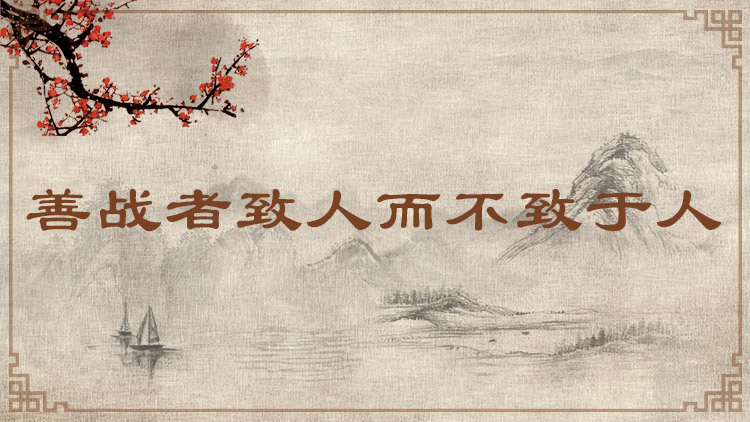A Person Skilled at Warfare Controls His Opponents and Is Not Controlled by Them

善于打仗的人能够调动敌人而不被敌人所调动。其要义在于强调掌握战争的主动权。在战场上,军队指挥官能驾驭战争并使之向着自己所期望的态势变化,是取得战争胜利的先决条件。战争的主动权以一定的客观条件和主观指导为基础,并随着敌我双方力量的消长和指导思想的正确与否而随时发生变换。战争的敌我双方,都力争在交战时间、地点选择及力量对比等方面将主动权掌握在自己手中。争取主动权的方法主要是运用灵活机动的战略战术,破坏敌之有利状态,造成敌之弱点,瓦解敌之斗志,阻止敌之意图等。主动权思想不只是很高的军事智慧,对其他领域的工作乃至为人处世等也有启发意义。
A person who is skilled at warfare controls his opponents and is not controlled by them. The key point here is an emphasis on controlling the initiative in a battle. On the battlefield, a prerequisite for victory is the troop commander's ability to determine the course of battle and steer it in the desired direction. Initiative in a battle is based on various objective conditions and subjective commands, and it constantly changes along with the changing balance of the opposing forces and the correctness of command concepts. During a battle, both sides try to take the initiative by controlling the time and place of engagement and the balance of forces. The main way to gain the initiative is to use flexible strategies and tactics to disrupt a situation which favors the opponent, to create weaknesses in him, to break his fighting spirit, and to thwart his plans. The concept of controlling the initiative is not only a manifestation of great military wisdom; it also offers insights for other areas of work and even for everyday behavior.
引例 Citations:
◎凡先处战地而待敌者佚,后处战地而趋战者劳,故善战者致人而不致于人。能使敌人自至者,利之也;能使敌人不得至者,害之也。故敌佚能劳之,饱能饥之,安能动之。(《孙子·虚实》)
凡是先到达战场等待敌方到来的一方是安逸轻松的,后到达战场仓促交战的一方则是疲劳的,所以善于打仗的人能够调动敌人而不被敌人所调动。或示以小利,诱使敌军自己进入我方指定的战场;或设法阻拦,使敌军无法到达相应的位置。所以,敌若安逸轻松,我则要设法使之疲劳;敌若粮草充足,我则要设法使之挨饿;敌若安稳驻扎,我则要设法使之移动。
Whoever is first on the battlefield and awaits the foe will be rested, and whoever arrives late and rushes into battle will be tired. Hence, one who is skilled at war can control his opponents instead of being controlled by them. He may use some small advantage to lure the enemy to a battlefield of his own choosing; or he may put the enemy at a disadvantage by preventing him from reaching the battlefield. Thus a rested enemy can be made exhausted, a well-fed enemy can be made hungry, and a settled enemy can be made to move. (The Art of War)
◎敌好击虚,吾以虚形之;敌好背实,吾以实形之。然而所击者非其虚,所背者非其实。故逸能劳之,饱能饥之,此所谓致人而不致于人也。(《宋史·兵志九·训练之制》)
敌军如果想要攻击我兵力薄弱的地方,我即伪装成兵力薄弱的样子;敌军如果想要避开我兵力厚实的地方,我即伪装成兵力厚实的样子。但实际上,敌军所攻击的并不是我薄弱的地方,所避开的也并不是我厚实的地方。所以,敌军若安逸从容,我就要设法使之疲劳;敌军若粮草充足,我就要设法使之挨饿。这就是所谓调动敌人而不被敌人所调动。
If the enemy wants to attack me where I am weak, I make my forces pretend to be weak; if he tries to avoid me where I am strong, I make my forces appear to be strong. But in fact the enemy will not be attacking me where I am weak, nor will he be avoiding me where I am strong. Thus if the enemy is relaxed, I will try to exhaust him, and if he is well-fed I will try to make him go hungry. This is known as controlling one's opponent and not being controlled by him. (The History of the Song Dynasty)
◎多方以致敌之来,我据便地而待之,无有不胜。法曰:“致人而不致于人。”(《百战奇略·致战》)
千方百计调动敌人前来交战,我则占据有利地形以逸待劳,这样没有不打胜仗的。诚如兵法所说:“调动敌人而不被敌人所调动。”
I will use every means possible to entice the enemy into battle, where I await him at a place where the terrain is favorable to myself. This way, I am assured of victory. As the book on warfare says, "Control others and do not be controlled by them." (Extraordinary Strategies for Various Types of Battles)
推荐:教育部 国家语委
供稿:北京外国语大学 外语教学与研究出版社
责任编辑:钱耐安





